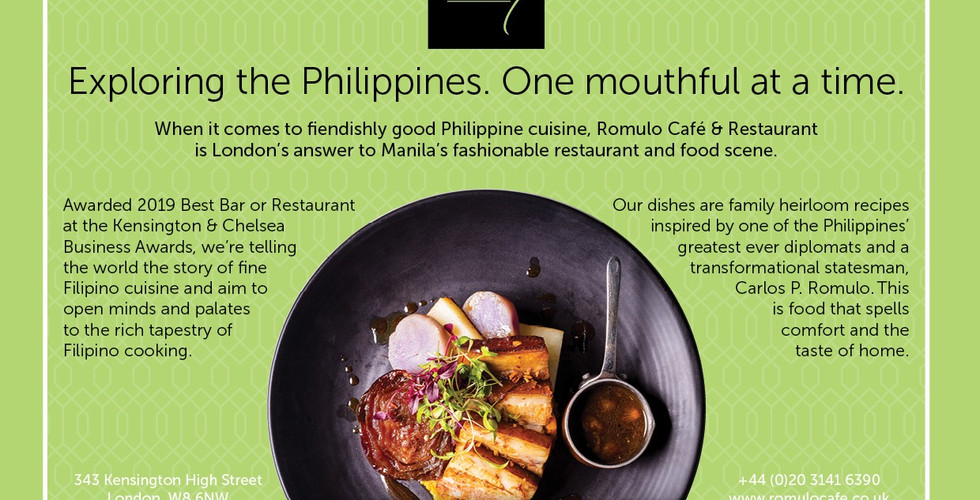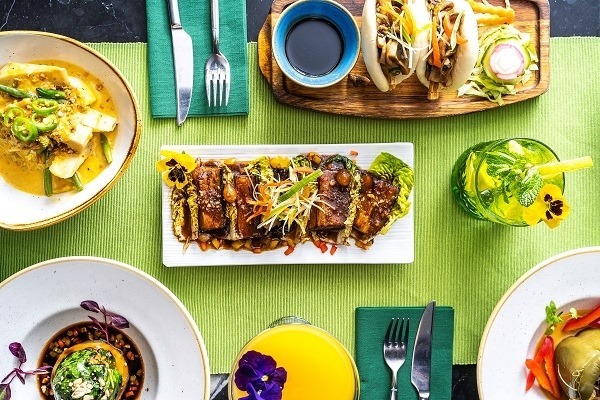How Filipinos can promote Filipino cuisine in the UK
- Rex De Guzman
- Jul 27, 2020
- 8 min read

Filipino food. Comforting to those who grow up eating it and mixed opinions from the rest.
But where are we with Filipino cuisine? How can we create more demand? What can we do to support?
Filipinos all over the United Kingdom are mustering up the courage to start a Filipino food business of their own. Whether it is a bakery from home, a supper club, a street food stall or a brand new restaurant concept, there are Filipino's who are undeniably passionate about their native cuisine and are taking the risk of going into business to champion a niche cuisine that is very much; underrepresented, misunderstood and certainly, underrated.
What are the most common problems or questions that arise when we talk about Filipino food?
You could speculate all day about why Filipino food has long been lurking in the shadows so to speak, but if we want our cuisine to progress, we have to be able to answer the questions that Non-Filipinos keep asking or assuming. I have had to without prejudice, challenge Filipino cuisine myself by looking into the most frequently asked questions and statements about Filipino cuisine and the obstacles it faces.
So what are they? I ran a search on Filipino cuisine to see what results would auto generate and here is what I have found.

1) WHAT DOES FILIPINO FOOD TASTE LIKE?
I have found that this question is often followed by; "is it like chinese food? (or insert other asian country).." well yes, yes it is or, no, not exactly... it depends how you want to explain it right?
The most common problem that I have noticed is that - while we do have an incredibly complex and rich history with a huge amount of foreign influence, trying to summarise what Filipino cuisine IS and IS NOT simply takes too long and I have found that it can be difficult at times to maintain a level of interest when being asked - only to end up having a monologue about the history of the Philippines. Now imagine if you were asked to create an elevator pitch (20-30 seconds) to describe Filipino cuisine, how confidently could you do it? - Leave your description of Filipino cuisine in the comments section below.
Personally? mine would go something like this:
"The Philippines is a South east Asian cuisine with bold, salty, sweet and sour flavour profiles being the most prominent in our dishes. A few commonly used ingredients in Filipino cooking would be; vinegar, garlic, citrus fruits such as Calamansi, unique seasonings such as "bagoong" (fermented fish or shrimp paste) and rice as a staple. What distinguishes Filipino cuisine from the rest of South East Asia is the nation's culturally complex and rich history of trade and colonialism.."
I'm no poet, but I think that defining and identifying our flavour profiles, ingredients and what distinguishes us from the rest, provides more clarity as an introduction to Filipino cuisine before delving into its deep history.

2) FILIPINO FOOD IS UNHEALTHY
Before you get defensive about this statement, it is important to acknowledge that this is the current perception of many. So be honest, how many of our dishes would you say could do with a little less cholesterol? The undeniable growth of veganism and other alternative diets at present, show that consumers are much more aware of what they are digesting and this only drives the idea of Filipino food being unhealthy even more.
With the amount of deep fried foods, street foods as well as heavily meat oriented viands to choose from, you have to admit that there is some truth to it. But not all Filipino food is unhealthy. So how can we remedy this?:
Highlight dishes that are more balanced and nutritious i.e Sinigang, Pinakbet, Dinengdeng. Ensaladang Talong, Lumpiang Sariwa, Kinilaw etc.
Be open to adapting our cuisine to meet dietary and even religious requirements. One example would be using a protein other than pork as an alternative when cooking a typical Filipino meal for a Muslim perhaps.
Adopt both points above when considering what to offer to those who are skeptical about trying the cuisine. You will find that doing both of these can contribute to a more balanced menu offering that appeals to others.

3) WHAT IS FILIPINO FOOD KNOWN FOR?
I thought it was Adobo? no, it's Sinigang! Actually, it's Lechon. But didn't Anthony Bourdain mention Sisig? We are too busy bickering amongst ourselves instead of focusing our individual efforts in promoting whatever dish we think best represents our cuisine. This is only part of the conversation. The complexity of Filipino cuisine doesn't exactly make this any easier, but I do think that Filipino cuisine needs a "front cover".
I see 2 ways to tackle this:
Decide as a nation what dish officially represents The Philippines. If we can't come to a conclusion on this, even at least from a marketing perspective, then it is no surpise that this question is appearing as a top search result.
Be confident in a specific dish of your own choosing and cook and promote it in your way! Because food is subjective.
Everyone knows sushi is Japanese, but they also now know that Chicken Katsu curry is too, and ramen, and tempura, the list goes on.

4) WHY IS FILIPINO FOOD NOT POPULAR?
This might seem like we are going around in circles, but this question goes beyond just food. I say... "refer to the above" and add the following points below for consideration:
Pride
Pride in our food seems to be largely on display when we are speaking to other Filipinos. We are certainly prideful about our cuisine when it comes to letting others know that our mum or grandmother makes the best adobo or bibingka, or when it comes to discerning which province of the Philippines a certain dish originated from and this is great! Yet I find more often than not, that our level of pride does not seem to match when we speak about it to non-Filipinos.
Is it the colonial mentality? Filipino's are naturally such warm, welcoming and hospitable people when it comes to inviting foreign people and cultures. We often treat the west with great respect, but what about ourselves? how much value do we place in our own pride and culture let alone our food? can our dreams be our goals too?
Standards
We need to raise our standards. If you are not happy with something, make a change so that you can become happy. Similarly, if we raised our standards and expectations of how we cook and present our food, we should see a return of great satisfaction from those who decide to give Filipino cuisine a try. How many times have you been to a Filipino restaurant and said smugly to yourself; "we can make this at home?" or "my mum makes this better." Instead, consider changing your focus. Ask yourself; "am i enjoying this?" and "would I recommend this to a friend?" If the answer is a resounding no, then I'm sorry, but the restaurant simply needs to do better.
Crab Mentality & Innovation
Raising our standards means making a change, with that in mind, how open are we to innovating our own cuisine? Earlier in this post, I mentioned a couple of points about how we can highlight more balanced and nutritional dishes or adapt dishes to meet the needs of those with dietary requirements or religious beliefs. The same goes for presentation, taste, textures, and anything that appeals to our sense of eating and pleasure.
"Oh, but it's not authentic!" I have 2 short responses for this: 1) go and eat whatever you think is "authentic" in the Philippines. 2) If taste is subjective, then interpretation is also.
Our focus needs to change if we want change to happen. If we want others experience Filipino cuisine on a restaurant level, then the standards & demands of the market need to be met. Otherwise, there will never be room for a popular Filipino restaurant chain to thrive and I don't mean a Jollibee.

Entrepreneurship
Whether you are a pioneer of the cuisine or waiting for the right moment. Filipino cuisine will truly bloom when we create more demand in the market and actively address any problems and issues along the way. The more businesses that emerge, the more clarity we will all have on how we can popularise the cuisine in the UK and internationally. Take pride, raise your standards and be open to innovation.
What can we do to support Filipino food in the UK?
Physically
Go and eat at a Filipino establishment or supper club. Spend some money (don't ask for a discount) and try to understand what it is that a Filipino food business owner is trying to achieve other than make a profit.
Digitally
Everything is at the touch of a button now. Startups need all the marketing help they can get on social media. It takes just a few seconds to share a post, leave a comment on an article or picture - or tag a friend in a facebook page. Show some love, don't just scroll mindlessly past your friends business, you would be surprised how much these actions can help.

Roni Bandong, founder of 'Roni B's Kitchen' - an award winning supplier of quality made Filipino sauce products said:
The rise of many food start-ups may look and sound glamorous but it is really hard work. Creating the product is the easy part. Getting this made, recognised, marketed and distributed is like falling into the rabbit hole. Now, think about how this challenge increases when the product is about Philippine flavours, which is very much unknown in the UK. It is like you are climbing Mt Everest twice!
It is nice to see many Filipino entrepreneurs around the UK grabbing the reins of courage to launch food businesses. As Filipinos, let us celebrate each other by extending our support to these businesses. Collaborate and join forces. Our job is getting our message about our cuisine out there. Ignite the Bayanihan spirit!
Promote Tourism
The Department of tourism is a pillar for Filipino cuisine to stand on. One online survey suggests that consumers of a specific countries' cuisine, positively correlates with the number of visits to that country. In other words, the more visits that the Philippines gets as a tourist destination, the more interest that Filipino cuisine will receive as a whole.

Source: https://www.fsc.uk.com/wp-content/uploads/2016/08/Wing-Yip-Oriental-Food-Report_final-approved.pdf
Educate and Inform
Educate yourself so that you can educate others and address the frequently asked questions and concerns. The more enlightening conversations that we have about Filipino cuisine, the more interest and awareness that we can generate in the market!
Do you agree with the points raised? Share this post with your fellow Filipino foodie friend and see what they say.
Where can I find Filipino food in the UK?
Products
Roni B's Kitchen

Our driving goal is to introduce Philippine flavours to the UK by producing products that will make this easy to do at home. Our un-official tagline is ‘Get the UK cooking and eating adobo one jar at a time.’
Our biggest achievements include winning the 2016 cook-off at Channel 4’s Kristie Allssopp’s Handmade Christmas, becoming a contributing author to the first edition of The New Filipino Kitchen cookbook, and being awarded a star at the Great Taste Awards 2019.
www.ronibkitchen.co.uk
FB - @RoniBKitchen
Twitter - @ronibkitchen
IG - @ronib_kitchen
Establishments
Romulo Café
IG: @romulocafelondon
FB: @romulocafelondon
Street Food
MAMA Z (Manchester)
Zosima Fulwell aka Mama Z. Established in 2017 and doing pop ups, street food, supperclub and catering events in Manchester and the North West. Make Banana Ketchup and is available to buy in several stores in MCR or via my website www.cookingwithmamaz.com. Contact Mama Z for any info or event bookings at:
Instagram: @cookingwithmamaz
Twitter :@cookinwithmamaz
TURO TURO (London)
Currently paused trading until 2021. TURO TURO aims to popularise Filipino cuisine one dish at a time and serves delicious and exciting Filipino BBQ inspired dishes such as their signature Chicken Inasal with a Lemongrass butter glaze or their award winning vegetarian charred aubergine with soy garlic glaze that won the title of 'Best Vegetarian Dish' at the British Street Food Awards 2019 sponsored by Hellman's.
IG - @turoturoldn
FB - @turoturoldn
Supper Clubs
Baboy Club
Launched by Maria Garbutt-Lucero in 2018, Baboy Club is a Filipino supper club in London serving a home-style sharing feast of dishes from her childhood in Manila. She shares her recipes on www.baboyclub.com and does private catering from banquets to BBQs. During the Covid-19 lockdown, she switched her attentions to the #FilipinoFood4NHS project, fundraising and cooking free Filipino meals for NHS staff along with several members of the Filipino Food UK community.
Twitter: @baboyclub
IG: @baboyclub
Bakery
Pinocandy
Taking inspiration from the colourful world of filipino desserts, Nico Almontero introduces us to Pinocandy, founded in 2018 this online bakery brings the sweet taste of pinoy desserts to london. It offers cupcakes, tarts and costom bespoke cakes of any occasions.
With the perfect blend of tropical flavours and classic dessert recipes, Pinocandy will surely satisfy your cravings. Pinoycandy will open their first bricks and mortar site in Holloway very soon.
FB: @pinocandy
IG: @pinocandy
Share this post with someone who loves Filipino cuisine !






































